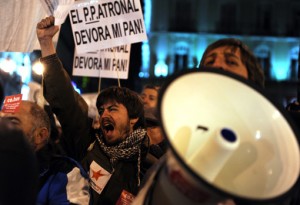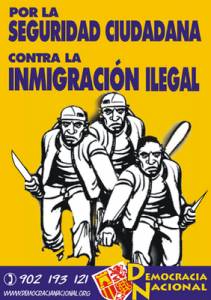Eight ways to read the Spanish crisis (part 1)

Manifestation against labor law reforms, Madrid, February 2012. Photo Fernando Sánchez, Lamarea.com.
(Versión en castellano.) The economic crisis in Spain, which many thought short-lived, appears to have no end in sight. Some still find solace in the memory of previous crisis patterns and maintain that there is light at the end of the tunnel. For others, Spain’s road ahead is much like Greece’s, or like the ordeal of other countries that went through cutbacks in the 1980s and ‘90s. But the truth is that most people have little time to consider the bigger picture. They are simply struggling to make it till the end of the year, the end of the month, or the end of the day.
And yet everyone has a story—a narrative of the crisis that points to some responsible party, and claims to know whose feet should be held to the fire to begin finding some solutions. These stories have emerged and coexisted in Spain for the past couple of decades; they are not always clearly defined, and many people combine several narratives into one. Some have enjoyed wide acceptance or endorsement from the powers that be in the media and the political system, while others have remained below the surface or limited to minority opinion.
Interestingly, the crisis has helped erode some of the most dominant narratives, leaving room for alternative explanations to emerge. In this first installment, I’ll focus on some long-time dominant stories that are rapidly losing steam. Key terms are italicized.
Narrative 1: “The problem is Spain’s backwardness”
This account is rooted in a negative view of Spanish history that focuses on its civil wars, its lack of economic development, and its string of dictatorships, particularly Franco’s almost forty-year long reign (1939-75). As a result, this narrative is fascinated with the notion of Spain’s exemplary transition to democracy of the late 1970s and the spirit of that transition, both of which are credited not only with ending the Regime (i.e., Francoism), but with preventing a new civil war and laying the foundations for Spain’s development. This is primarily understood to be its economic development—generally referred to as progress, given that it occurred under the progressive government of the Socialist Party, which ruled Spain from 1982 until 1996. The second key element in this account is Europe, which is sometimes understood to be the entire European Union (EU), but sometimes more specifically refers to northern Europe, particularly Germany, France, or Sweden. Europe, in this narrative, functions as the external, civilized warrantor of the peace and progress that Spain never had.
Within this narrative, the present crisis is read as an unfortunate relapse, a return to Spain’s more habitual historical pattern. Now that the spirit of the Transition seems to have collapsed, there is little hope for the country left, and the best one can do is save one’s own skin. The collapse of the spirit of the Transition is alternatively blamed on the Right or on the younger generations—the generations, that is, who were born after the transition and who are now, naïvely, demanding “real democracy,” “the recovery of historical memory” and “historical justice.” In practice, these irresponsible demands represent a serious danger to the country’s peace and peaceful coexistence (convivencia).
Now that the culture of the Transition is rapidly losing support and Europe has turned from a panacea into a problem, this narrative is facing a steep decline.
Narrative 2: “The problem is the PSOE, the unions, and the nationalisms”
This account takes off from a positive view of Spanish history. It places the origin of the Spanish nation somewhere between 520 and 1.2 million years ago, and includes among the country’s proudest achievements events such as Spain’s Reconquest from the domination of the Moors; the Spanish colonization of the Americas and much of the rest of the globe, turning Spain into an Empire in which the sun never set; the peaceful Restoration engineered by Prime Minister Cánovas in the late 19th century; or the economic development made possible by Franco’s technocrats in the 1960s. Three major interruptions mark this glorious history: the Second Spanish Republic of 1931-36, the electoral victory of the Socialists in 1982, and the second socialist victory of 2004. According to this narrative, the Socialist Party has ruined the country because its members are simply worthless—that is, they are incompetent managers. Politics aside, Spain has ceased being a major world power due its lack of a culture of achievement among its workers and students, who don’t have sufficient respect for the country’s embattled entrepreneurs or doers (a notion resonant of Romney’s job creators). The labor unions are the enemies of freedom, aka the free market, because their lazy leadership is bent on defending its lazy and unproductive rank and file, which is responsible for Spain’s loss of greatness.
Meanwhile, the nationalisms—which are always implied to be Basque and Catalan nationalisms, because Spanish nationalism, if it exists at all, is properly called patriotism—are bent on dismembering Spain. They do not understand the culture represented by José Tomás and instead put their lot in with the puppeteers.
In this account, the economic crisis is blamed on the government of José Luis Rodríguez Zapatero, or ZP. His eight-year stint in power (2004-2012) was even worse than Felipe González´s felipismo (1982-1996), because Zapatero was not only incompetent: he was also a do-gooder. Zapatero shares the blame for Spain’s ruin with the working class, who in addition to being lazy have collectively lived above their means.
This particular account, which until recently had a strong presence in the media and in politics, has stagnated of late; after all, it has lost its main explanation for the crisis—the fact that the Socialist PSOE is in power. Still, it feeds itself off the continuing hatred of the labor unions and the nationalisms.
Narrative 3: “The problem is politics”
This account pays little attention to Spanish history, except perhaps when it refers to the Civil War of 1936-39 as a “war among brothers for political reasons” and to Francisco Franco as “an evil man who nevertheless built a lot of lakes” (in reference to the dictator’s infamous construction of artificial lakes for water distribution and energy generation). This story points its accusatory finger to politics: that most boring of topics which always causes bitter disputes and only ends up fueling hatred among people who would otherwise get along fine.
In this account, politics, the parties, the politicians are used interchangeably. They are defined, among other things, as the content of the heated debates among talking heads on the commercial TV network TeleCinco, the dinner table shouting matches among families over Christmas meals, or the tantrums of a “political” friend, acquaintance of family member who doesn’t know when to stop pushing everyone’s buttons.
From this point of view, one’s best option is to be apolitical. This means not bothering to vote, or at most submitting a blank ballot at the polls. Actions like these serve to underscore that one is above the whole dirty world of politics, that one loves one’s friends and family members regardless of their ideas, and that one is sick of the way politics either fuels needless conflict or bores everyone to death with its endless meetings and sermons. Those who buy into this account will also wonders openly why people cannot just simply resolve their differences with some common sense, without ideology. In any case it’s much better to spend one’s time working, going out for a drink with friends or watch television, any television, as long as it is not about politics.
Although this account was hegemonic for many years it, too, is losing support. For one thing, it is losing steam because since the outbreak of the crisis political decisions are increasingly affecting people’s daily lives. For another thing, the appearance in the public sphere of protest movements such as 15-M has made it possible to conceive of politics apart from the established politicians and their parties.
 Narrative 4: “The problem is the immigrants”
Narrative 4: “The problem is the immigrants”
According to this account, which embraces a version of Spanish history that sits somewhere between narratives 2 and 3, it is immigrants, especially illegal immigrants, who are the main cause of unemployment, the disintegration of the social safety net, and social conflict generally. Immigrants, in this version of events, take jobs away from Spaniards. On top of that, they stubbornly refuse to integrate. To make things worse, the country’s spineless politicians, instead of sending these immigrants back to their own countries, shower them with papers, houses, and mosques.
Immigrants, with the help of powerful mafias, are invading Spain with their avalanches of boats and their attempts to scale border fences. They are also the main cause for the increase in crime and the erosion of safety and security. The solution, then, is to give jobs to Spaniards first or simply beat the illegals back to their country.
It’s hard to argue that this account is losing legitimacy. It is true that immigration no longer ranks very high as a problem in opinion polls, and that the media have not given it too much attention of late. This may be due to the fact that the political parties barely address the issue any more; other possible explanations include the fact that the recent protest movements have identified other causes for the crisis, that crime rates have fallen despite the rise in immigration, or that a large sector of immigrants are from Spanish-speaking countries. In addition, the only political party that has made immigration its central plank, Plataforma per Catalunya (Platform for Catalonia, or PxC), has seen its rapid rise in the polls followed by an equally rapid decline. And yet immigration still looms under the surface as an issue that can be easily be mobilized when others fail—witness not only what happened in Spain a couple of years ago but what we see happening today in Greece, Italy, and France.
This is the first of a two-part series. The second installment will sketch four narratives that are emerging or gaining increasing support: (5) The problem is the “political class,”; (6) The problem is the boss; (7) The problem is Madrid; (8) The problem is the system.
Jorge Gaupp holds a BA in Political Science from the Universidad Complutense de Madrid (UCM), an MA in International Development from the Instituto Complutense de Estudios Internacionales (ICEI) y an MA in Secondary Education from the UCM. He currently works at Oberlin College, OH.













